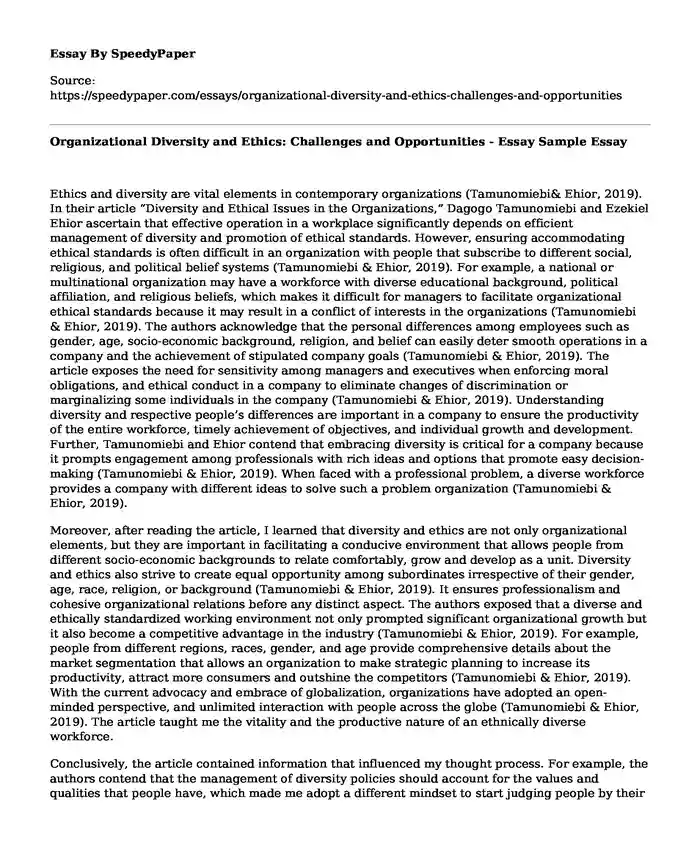Ethics and diversity are vital elements in contemporary organizations (Tamunomiebi& Ehior, 2019). In their article “Diversity and Ethical Issues in the Organizations,” Dagogo Tamunomiebi and Ezekiel Ehior ascertain that effective operation in a workplace significantly depends on efficient management of diversity and promotion of ethical standards. However, ensuring accommodating ethical standards is often difficult in an organization with people that subscribe to different social, religious, and political belief systems (Tamunomiebi & Ehior, 2019). For example, a national or multinational organization may have a workforce with diverse educational background, political affiliation, and religious beliefs, which makes it difficult for managers to facilitate organizational ethical standards because it may result in a conflict of interests in the organizations (Tamunomiebi & Ehior, 2019). The authors acknowledge that the personal differences among employees such as gender, age, socio-economic background, religion, and belief can easily deter smooth operations in a company and the achievement of stipulated company goals (Tamunomiebi & Ehior, 2019). The article exposes the need for sensitivity among managers and executives when enforcing moral obligations, and ethical conduct in a company to eliminate changes of discrimination or marginalizing some individuals in the company (Tamunomiebi & Ehior, 2019). Understanding diversity and respective people’s differences are important in a company to ensure the productivity of the entire workforce, timely achievement of objectives, and individual growth and development. Further, Tamunomiebi and Ehior contend that embracing diversity is critical for a company because it prompts engagement among professionals with rich ideas and options that promote easy decision-making (Tamunomiebi & Ehior, 2019). When faced with a professional problem, a diverse workforce provides a company with different ideas to solve such a problem organization (Tamunomiebi & Ehior, 2019).
Moreover, after reading the article, I learned that diversity and ethics are not only organizational elements, but they are important in facilitating a conducive environment that allows people from different socio-economic backgrounds to relate comfortably, grow and develop as a unit. Diversity and ethics also strive to create equal opportunity among subordinates irrespective of their gender, age, race, religion, or background (Tamunomiebi & Ehior, 2019). It ensures professionalism and cohesive organizational relations before any distinct aspect. The authors exposed that a diverse and ethically standardized working environment not only prompted significant organizational growth but it also become a competitive advantage in the industry (Tamunomiebi & Ehior, 2019). For example, people from different regions, races, gender, and age provide comprehensive details about the market segmentation that allows an organization to make strategic planning to increase its productivity, attract more consumers and outshine the competitors (Tamunomiebi & Ehior, 2019). With the current advocacy and embrace of globalization, organizations have adopted an open-minded perspective, and unlimited interaction with people across the globe (Tamunomiebi & Ehior, 2019). The article taught me the vitality and the productive nature of an ethnically diverse workforce.
Conclusively, the article contained information that influenced my thought process. For example, the authors contend that the management of diversity policies should account for the values and qualities that people have, which made me adopt a different mindset to start judging people by their values and contributions rather than race, gender, age, or religion. The article keenly advocates for the elimination of all bias during selection, performance assessment, promotions, or opportunities. As managers aim to become more competitive in their industries, they must embrace diversity and promote ethical standards that accommodate all employees. The article made me realize the value of people’s differences and the influence of effective leadership in prompting efficient organizational ethics that considered possible diversity.
Reference
Tamunomiebi, M. D., & Ehior, I. E. (2019). Diversity and ethical issues in organizations. International Journal of Academic Research in Business and Social Sciences, 9(2), 839-864. https://hrmars.com/hrmars_papers/Diversity_and_Ethical_Issues_in_the_Organizations.pdf
Cite this page
Organizational Diversity and Ethics: Challenges and Opportunities - Essay Sample. (2023, Nov 30). Retrieved from https://speedypaper.net/essays/organizational-diversity-and-ethics-challenges-and-opportunities
Request Removal
If you are the original author of this essay and no longer wish to have it published on the SpeedyPaper website, please click below to request its removal:
- Super Hero Feminism, Free Sample of an Essay
- Development of the Second Party System and the Civil War, Paper Example
- Free Essay. Mental Health Problems Among Immigrants in the UK.
- Essay Sample on Waldstreicher's article "How the Constitution was Indeed Pro-Slavery"
- Free Essay Example - Communication and Disability
- Essay Example: Culture Workshop
- Paper Example. Empowering Learners and Parents Program
Popular categories





